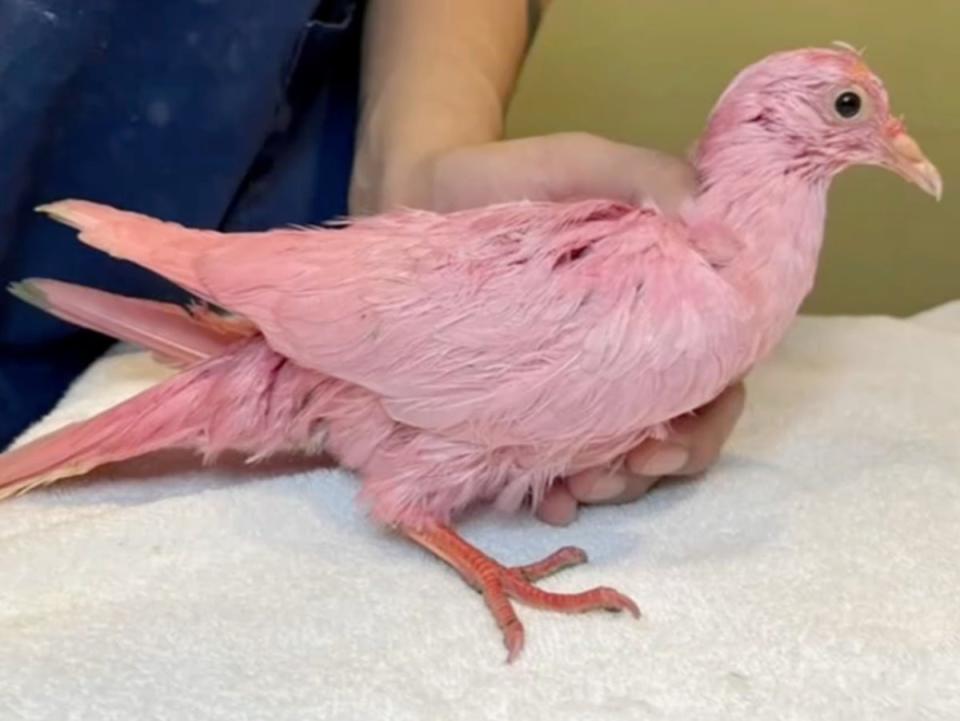From dyed pigeons to wildfires, how gender reveals became the most problematic trend

You know how it goes. Two excited, slightly nervous parents-to-be stand before a crowd of friends and family. Someone sticks a pin into a giant balloon and – pop! – pink confetti everywhere. “It’s a girl!” a grandmother joyously shouts – as if that wasn’t already clear by the bright pink fireworks now going off somewhere in the background. Meanwhile, someone zooms in on the couple as they hug and cry.
These are the typical scenes of a gender reveal party, in which people get together and watch expectant parents find out the sex of their unborn child. Naturally, the entire thing is a performance for social media, and the more outlandish the affair, the more views you’ll get (#gendereveal has 36 billion views on TikTok). The initially innocuous trend began in 2008 after a blogger named Jenna Karvunidis sliced open a cake on camera to reveal its pink sponge. But the phenomenon is snowballing into something ugly. Last week, the RSPCA issued a warning following the death of a pigeon that had been dyed pink for one such party. Leicestershire Wildlife Hospital shared a post on Facebook of an injured bird that had been brought in, after which the charity’s spokesperson urged people to “think before you follow these social media trends” and branded it an “act of cruelty”.
Other dark outcomes have made headlines in previous years: one gender reveal-gone-wrong led to a 47,000-acre wildfire in Arizona in 2018 that caused $8m worth of damages; another involved an explosion that killed a soon-to-be grandmother in 2019. Meanwhile, environmentalists continually warn people of the ecological impact of using copious amounts of confetti and coloured substances at outdoor events.
And yet couples seem to be in a race to make these indulgent spectacles ever more outlandish. American YouTuber Logan Paul and his fiancee Nina Agdal staged a public wrestling match, with the competitor in the pink trunks rigged to win. Lithuanian influencer Inga Stumbriene hired three aeroplanes, leaving sapphire smoke trails in the sky. Another influencer couple jumped into an ice bath and exploded a substance that turned the water navy.

The excess of these parties bothers me. But I’m also concerned by the way they reinforce stereotypes about gender that deny any sort of nuance. Of course, it would be satisfying to find out details about the child you are about to raise. And there is reason to celebrate, since many parents go through emotionally taxing and sometimes expensive processes to conceive; they deserve to embrace the excitement. But these events feed idealised images about gender identity that are outdated and binary. The social media spectacle of it all can feel insensitive towards people experiencing fertility issues, too.
Even Karvunidis, the mother who started the trend, has since said she has lived to regret it. In a 2020 interview with The Observer, Karvunidis admitted she now finds the trend problematic. “Who cares what gender the baby is?” she wrote in a 2019 Facebook post, alongside a picture of her daughter wearing a blue blazer and matching trousers. “Plot twist: The world’s first gender-reveal party baby is a girl who wears suits!”
Karvunidis spoke about the guilt she felt after creating an entire identity for her child, Bianca, before she was even born. She said Bianca grew up to dress androgynously, and while Bianca uses she/her pronouns, she does not follow the pretty-in-pink ideal her mother had manifested for her. “When I first saw that a gender reveal party had caused a forest fire, I cried because I felt responsible,” said Karvunidis, who admitted in hindsight that she had hoped she would have a girly girl. “There’s such an obsession with gender that it becomes limiting in many ways and exploitative in others.”

That’s the problem: the gender reveal part confuses gender with biological sex. There’s also a risk that it places pressure on children to conform to a certain stereotype, one that can be destructive to their self-expression and self-esteem and can perhaps discourage them from feeling comfortable exploring their identities. In the case of Karvunidis, she accepted her daughter upon learning that Bianca didn’t want to fit into this mould. But as the trend only gets more popular, I worry about how it will only make new parents more attached to a particular image of their future child, which denies that child any room for difference beyond the Barbie vs Lego pathways. It feels like a norm from bygone times.

I can already hear the “let people enjoy things” brigade. And a few other brigades, too. I’m happy to leave people to it. But it’s worth considering how a child might feel when they grow up to learn that their parents hosted a rather egregious event in the name of their assigned sex. What if that child grew up to be gender non-conforming? Perhaps they’d feel like they’d let their parents down, or that they couldn’t comfortably express themselves at home. Setting unrealistic goalposts for children rarely ends well. Maybe it’s time that parents-to-be put down the fireworks, leave the pigeons alone, and consider this first.


